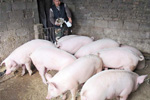Rural-urban shifts put China on development alert
Updated: 2012-01-31 13:29
(Xinhua)
|
|||||||||||
GUANGZHOU - Since settling down in this southern metropolis bordering Hong Kong over 20 years ago, Zhang Xiyang, a former farmer from Southwest China's Sichuan province, has grown accustomed to celebrating the Spring Festival like local Cantonese do.
Instead of watching China Central Television's live telecast of the evening gala, the 50-year-old man and his family did some shopping at a flower market on the eve of the Year of the Dragon.
Though rarely eating dumplings in his home village, Zhang entertained friends visiting over the week-long holiday with jau gok, or fried dumplings, a festival snack favored by Cantonese and shaped like a purse, symbolizing a rich, sweet life.
Reluctant to make the 2,000-km trip back home with heavy luggage, Zhang prefers inviting his relatives to celebrate the Spring Festival in Guangzhou, the provincial capital of Guangdong.
"It's too much hassle to return home. Relatives can come to our place to gain different experiences, and we can stay home for a nice, refreshing holiday," Zhang said.
With a steady income and a stable place of residence in the city, Zhang exemplifies the hundreds of millions of Chinese farmers who have joined the country's ever-expanding ranks of urbanites since China kick-started economic reforms at the end of 1970s.
From 2001 to 2010, Guangzhou's population has grown 27.74 percent, or by 2.76 million people, to 12.7 million. Over this period, the migrant population has expanded faster than that of registered residents, and the proportion of migrants to Guangzhou's resident population has jumped from 33.29 percent to 37.48 percent, according to the Sixth National Population Census completed in November 2010.
"The constant influx of rural migrant workers into cities -- a result of ongoing urbanization and industrialization -- will bring pivotal changes to the country's demographic landscape and force China to face the reality of diminishing demographic benefits," said Zheng Zizhen, former dean of the Sociology and Population Institute of the Guangdong Academy of Social Sciences.
Warning signs are already dotting the horizon, as China's urban population outnumbered rural residents for the first time as of the end of 2011. The country currently has 690.79 million urban residents, accounting for 51.27 percent of the country's total population of 1.35 billion, according to the National Bureau of Statistics. The rural population, by contrast, fell by 14.56 million to 656.56 million from 2010 to 2011.
Meanwhile, the working-age population, people aged 15 to 64, stood at about 1 billion, or 74.4 percent of the nation's total. The amount was down 0.1 percentage point from that of the previous year, marking the first decline since 2002.
"China is heading for a tipping point in its demographic advantages, as the family-planning policy coupled with the weakening inflow of rural migrants will eventually take away its developmental advantage of having a sufficient supply of working-age people and end the growth model of using cheap labor to foster economic expansion," said Zheng.
"Made in China" gets expensive
William Fung, managing director of Li & Fung Ltd, a Hong Kong-based manufacturing outsourcing enterprise that supplies garments, fashion accessories and other consumer goods, expected the salaries of Chinese people to grow by 80 percent overall in the next five years as a result of the shrinking working-age population.
"That will, of course, elevate the prices of products made in China," he said.
In recent years, China's labor-intensive manufacturing industries, especially clothing, footwear and toys, have been battling hard against the labor shortage.
Related Stories
Rural-urban learning exchange 2010-07-30 07:47
Rural-urban healthcare gap to be stitched up 2010-12-09 08:00
Rural-urban healthcare gap to be stitched up 2010-12-09 08:25
Rural-urban learning exchange 2010-07-30 15:35
- China to overhaul food standards
- Seven detained over S China river pollution
- Young migrant workers hope to settle in cities
- Shaolin told to clean up its image
- Zhejiang moving to ease financial pressures for firms
- China eyes overseas metal bases
- Beijing Telecom may launch CDMA iPhone 4S
- Policies chill property sales








